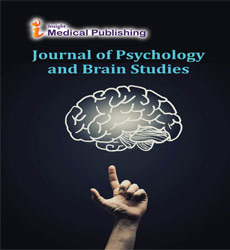COVID-19 Immunisation in People with Autism Spectrum Disorder
Robert Coin*
Department of Psychology, University of Southern Queensland, Springfield Central, Australia
- *Corresponding Author:
- Robert Coin
Department of Psychology
niversity of Southern Queensland, Springfield Central, Australia
E-mail: coinrob23@yahoo.com
Received Date: November 07, 2021; Accepted Date: November 21, 2021; Published Date: November 28, 2021
Citation: Coin R (2021) COVID-19 Immunisation in People with Autism Spectrum Disorder. J Psychol Brain Stud Vol.5 No.11:53.
Perspective
With the onset of the COVID-19 pandemic, concerns have been raised about the disease's physical and emotional consequences on people with autism spectrum disorder (ASD). A recent study discovered higher infection prevalence as well as a higher risk of hospitalisation among people with ASD. Individuals with ASD, it has been hypothesised, are more prone to physical comorbidities and are more likely to be infected by COVID-19 due to their difficulties changing routines and adjusting to public health recommendations. Despite the scarcity of studies examining COVID-19 immunisation rates among vulnerable groups, there are some indicators of potential discrepancies even when vaccinations are widely available. Scholars believe that some people will be less likely to take the COVID-19 vaccination due to general vaccine reluctance, a lack of scientific knowledge available to the public, and other cultural and ethical factors. Nonetheless, no study has been conducted to date to determine if persons with ASD have a same proportion of immunisation as the general population. Disasters and plagues, such as COVID-19, disproportionately affect those with severe and chronic mental illnesses.
However, there appears to be little research on how people with Autism Spectrum Disorder (ASD), one of the most common neurodevelopmental diseases in the world, react to catastrophe situations. With the various disasters throughout the world, such as terrorist attacks, tsunamis, storms, bombings, and earthquakes, a lack of focus on the psychological repercussions for children with ASD became apparent. However, aside from one study that found individuals with ASD to have decreased adaptive behaviours after being exposed to an earthquake, and another that found disaster awareness training to increase disaster preparedness in children with ASD, there is no data on how people with ASD react to disasters in general.
Pandemics are similar to other disasters in their unpredictability, fatalities, and long-term effects; however, they differ from disasters in that they prevent victims from converging and gathering, necessitating the opposite reactions of separation, isolation, and quarantine, which end up interfering with family norms and rituals that generally protect family functioning during crises. Such rituals are especially important in the ASD community, where repetitive behaviours and interests are a distinguishing feature of the disorder and affected persons follow strict daily regimens. Pandemics of infectious diseases, in addition to its health and lethality repercussions, are known to cause widespread anxiety and psychological difficulties.
TheWorldHealthOrganizationhasclassifiedthecurrentpandemic, COVID-19, a public health emergency of international concern. A recent study indicated that symptoms of children with attention deficit hyperactivity disorder (ADHD) worsened dramatically during the COVID-19 outbreak, emphasising the importance of focusing on special vulnerable populations during the pandemic. SD is defined by disruptions in social communication with limited and repeated areas of attention that begin in childhood and typically last a lifetime. There is little known regarding the effects of COVID-19-related changes in living environment on people with ASD. Our clinical observations and input from patients and caregivers indicate the presence of specific difficulties suffered by this population during the epidemic. These obstacles can be divided into four categories.
To begin, persons with ASD appear to have a different comprehension and knowledge of COVID-19 than their peers. Some COVID-19-related scenarios, on the other hand, may be simpler for some children with ASD and their families to deal with. Individuals with ASD have a better commitment to rules and routines, as well as aversion to sociability and physical touch, which may make it easier to follow prescribed hygienic measures such as frequent hand washing or avoiding physical contact with people or surfaces. The risk of sensory overload may be reduced because the children will be out of the house less frequently as aresult of the home confinement measures. In a recent qualitative study of children with special needs, the majority of whom have ASD, and their parents, Asbury discovered that a small proportion of participants reported some positive effects of the quarantine, such as not experiencing challenges of daily routines such as going to school or other public places, or anxiety of socialising with others. Findings from usually developing samples demonstrate that depression and anxiety symptoms were higher in elementary school children during the current COVID-19 outbreak than before the pandemic.
The COVID-19 lockdown was observed to have a significant negative influence on usually developing children's psychological, social, and physical welfare, but some children experienced mixed emotions since they felt joyful and calm while spending time with their families during the lockdown. Following H1N1 and SARS outbreaks, one-third of children and one-quarter of parents subjected to self-isolation or quarantine developed post-traumatic stress disorder. Individuals with ASD were mainly unable to comprehend what COVID-19 is, adjust to its measures of social separation and staying at home, and execute the necessary hygienic criteria. Specific ASD problems, such as hypersensitivity, may have an impact on mask wearing status, prohibiting people from taking precautions. These findings are consistent with parent accounts from throughout the world on how their children with ASD are dealing with and reacting to COVID-19 measures.
Open Access Journals
- Aquaculture & Veterinary Science
- Chemistry & Chemical Sciences
- Clinical Sciences
- Engineering
- General Science
- Genetics & Molecular Biology
- Health Care & Nursing
- Immunology & Microbiology
- Materials Science
- Mathematics & Physics
- Medical Sciences
- Neurology & Psychiatry
- Oncology & Cancer Science
- Pharmaceutical Sciences
